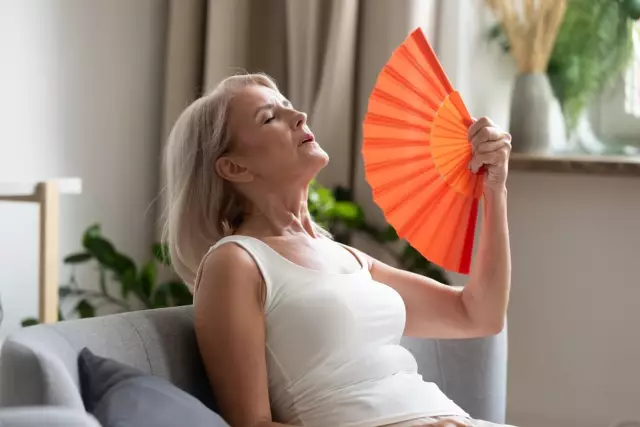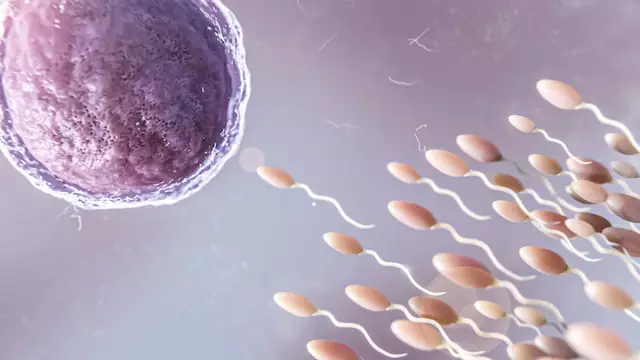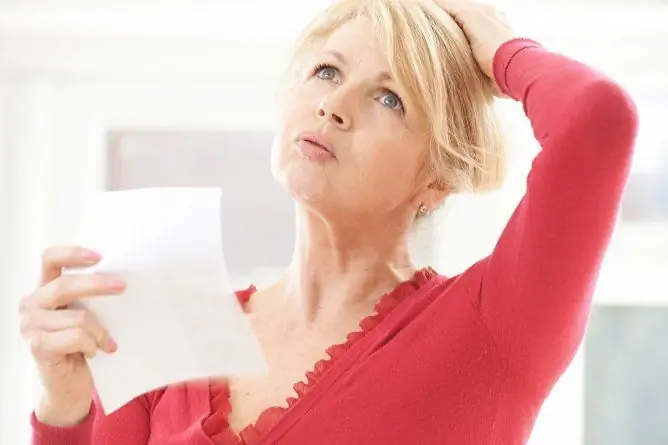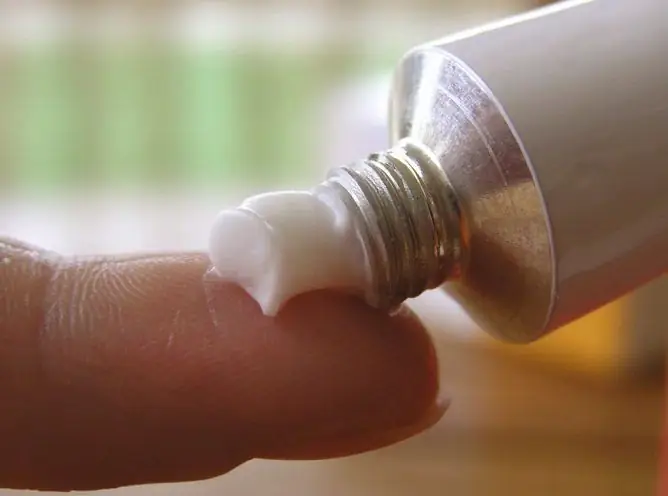- Author Rachel Wainwright wainwright@abchealthonline.com.
- Public 2023-12-15 07:39.
- Last modified 2025-11-02 20:14.
5 tips for relieving menopause symptoms
Menopause, or menopause, is a normal process of cessation of a woman's fertility, accompanied by serious hormonal changes in the body. Menopause usually begins between the ages of 50 and 55, but the characteristics of this process are very individual. Factors of an earlier onset of menopause are irregular sex life, numerous abortions, bad habits, the presence of endocrine, autoimmune and gynecological diseases, frequent stress and excessive dieting. The severity of menopause is also determined by heredity.

Source: depositphotos.com
Malfunctions in the body arising from menopause
A woman can herself understand that she has come to this moment in her life if she has some characteristic signs of the onset of menopause:
- first of all, the menstrual cycle is disrupted. In mild cases, menstruation simply becomes more rare and eventually disappears altogether. In some women, on the contrary, profuse bleeding occurs in violation of the timing, leading to massive blood loss;
- after the cessation of menstruation, the intensity of normal vaginal discharge is greatly reduced, dryness of the mucous membranes is observed, which causes burning, itching and discomfort during sexual intercourse. Such phenomena as urinary incontinence when coughing or sneezing, increased urge to urinate during sleep, burning and stinging in the bladder are not excluded;
- failures in the work of the autonomic nervous system occur one of the first, they are associated with a sharp drop in the level of estrogen in the blood. The most common are the so-called hot flashes: a woman feels heat on the surface of the face, chest, and sometimes palms. Then the skin becomes covered with profuse sweat, the heartbeat becomes more frequent, it becomes difficult to breathe. The attack goes away by itself within a few minutes. Typically, hot flashes are more common at night than during the day. According to their frequency, doctors give an opinion on the severity of menopause (up to 10 hot flashes per day is considered a mild violation that does not require medical intervention);
- sleep disorders (snoring, apnea, frequent awakenings, daytime sleepiness), nausea, dizziness, headache, and weakness;
- atrophy of the pelvic ligaments. As a result, the location of the bladder and urethra changes, which is fraught with prolapse of the uterus and vaginal walls;
- lack of estradiol in a woman's body. This affects the health of the bones. They become fragile (symptoms of osteoporosis appear), the risk of fractures increases even with weak mechanical stress. The vertebrae undergo so-called osteoporotic compression, which leads to the development of stoop and decreased growth. Patients experience lower back pain when standing and walking for a long time, complain of discomfort in the joints;
- negative changes in the condition of the skin due to a lack of nutrition of the integument. The skin becomes loose and wrinkled. Facial hair growth is enhanced. On the pubis and head, on the contrary, they fall out strongly;
- emotional disorders, which are expressed in unjustified irritability, feelings of anxiety and fear. Some women develop depressive moods, while others - a desire for defiant behavior, too bright clothes and makeup, which sometimes looks inadequate. Often, patients complain of intolerance to certain odors, loud sounds, bright light, etc.
How to get through menopause without too many problems
Menopause symptoms significantly reduce the quality of life. However, menopause is not a disease and will not be completely cured. But a woman can relieve unpleasant manifestations and go through this stage relatively painlessly. Experts advise when menopause approaches:
- give up all bad habits;
- change the diet in favor of the predominance of vegetables, fruits and "slow" carbohydrates;
- start taking vitamin complexes fortified with calcium;
- do physical exercise, hiking in the fresh air;
- try to get enough sleep and not get nervous.

Source: depositphotos.com
Compliance with the daily regimen and nutrition, as a rule, alleviates the condition with a mild degree of climacteric syndrome. If hot flashes occur more often than 10 times a day, it makes sense to consult a gynecologist. He will prescribe hormone replacement therapy, which will bring the body back to normal and reduce the intensity of unpleasant symptoms.
The period of menopause for each woman proceeds individually, therefore, in no case can self-medicate. A medicine, herbal remedy, or procedure that “worked well for your friend” can not only be useless to you, but also seriously harm your health. Competent behavior and timely access to a doctor will allow you to survive this difficult period of your life, while maintaining your health and ability to work.
YouTube video related to the article:

Maria Kulkes Medical journalist About the author
Education: First Moscow State Medical University named after I. M. Sechenov, specialty "General Medicine".
Found a mistake in the text? Select it and press Ctrl + Enter.






